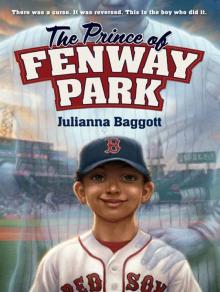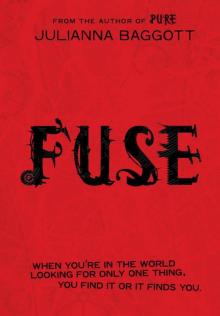- Home
- Julianna Baggott
The Miss America Family Page 12
The Miss America Family Read online
Page 12
“What?” I asked.
“I was hoping for a real family. The real Miss America family of my own making. The perfect family, Ezra, smiling faces around a steaming pork roast, a bright, happy kitchen always freshly scrubbed clean with S.O.S. And it would seem like I have that, wouldn’t it? It’d seem that way.”
We watched the roaming spotlights, Glenn Osser conducting in his headphones, Bert Parks, too, in his pale yellow tuxedo, and the dancers in their ruffled shirts skipping through dry-ice smoke. There were ads for Toni’s hair products, Dippity-Do and White Rain, and Oldsmobile “Escape from the Ordinary,” all excited about their auto windows and locks, “a new wiper and washer control at your fingertips.” And then my mother quick-stepping down the runway in her blue dress with its gold medallions, her Miss New Jersey banner across her chest. Bert Parks saying, “Miss America is a composite of positive wonders,” like he’d just made that up and didn’t it sound good? It was in color, but new color, not what we’ve got today. This color was always just a little off, her cheeks too pink, her forehead too pale, her hair a loud yellow, but she was beautiful, her face filling the screen.
When we heard Dilworth’s car in the driveway, Miss Colorado in her red leotard with its sequins, boa collar, and fringed bottom was twirling a baton to the tune of “Moon River.” Dilworth had obviously not had a good day on the golf course. His new partner, I figured, was more of a challenge than old Bob the podiatrist, distracted by the thought of his chickie in New Orleans. Dilworth slammed the back door and walked into the living room.
He said, “Pixie? Oh, Pix? Are we going to eat tonight?”
My mother didn’t answer. I kept quiet too.
He charged over to the screen, stood in front of it, to get our attention. Miss Colorado was twirling across his broad chest, his pink polo shirt. She could whip a baton over her shoulders, tip back her head, and roll the baton over her mouth. “Do we have to relive the glory days? Some people are hungry, you know, in need of nourishment. In the here and now. Do you think you could handle making dinner? Do you think you could handle that?”
My mother pointed at the screen. “She went on to Radio City Music Hall, twirling double batons on fire for their Christmas show.” Her voice was flat, expressionless. I couldn’t understand why Dilworth couldn’t see that something had changed, something serious had happened, and I wondered why I could see it so clearly, why it was so obvious to me and whether it was normal or not, this desire I had to cradle her in my arms and promise to take care of her forever, because that’s really what I wanted to do.
“Pixie,” he said. “Pixie.”
“In a little while, Miss Nebraska is going to be voted Miss Congeniality. She’s going to thank God for all of us.”
Dilworth said her name again, angry now. “Pixie!”
She looked into his eyes, not daring him, not pushing him, but showing weakness.
But he didn’t read her right, or maybe he did and decided to take advantage. “You know that beauty pageants are a joke. You know this, don’t you? If I told someone you were Miss New Jersey, they’d laugh. Right? Am I right?” He stood with the beauty contestants on his beefy ex-quarterback’s chest, including my beautiful mother, in the background now, just over Bert Parks’ shoulder, Bert Parks, with his white bottom teeth always showing, his serious eyebrows. Dilworth looked down, finally seeing what we were seeing. He marched from lamp to lamp, turning on each little switch, the overhead ceiling fan, too, mistaking one chain for the other. And suddenly the room was bright and windy, and I could just barely see the ladies on the screen, their hips pivoted to one side, waving their cupped hands. I could no longer tell which one was my mom. They all looked the same, suddenly grainy, faded, old.
Dilworth stood his ground, the dark hair on the back of his head flipping up in the fan’s breeze. My mother walked unsteadily up to bed, still clutching the bottle of scotch. She’d flipped off her shoes, so she was barefoot, the thin bones of the backs of her ankles so delicate. Now, looking back, that’s what I see most clearly, her delicate ankles, the pink heels of her feet.
Once she was out of the room, Dilworth turned to me. “What are you looking at, runt? See how you upset your mother. See? How is it that I have to deal with you, you snotty shit-for-brains.”
I wanted to yell at him, to tell him that he was the asshole around here, that one day my mother wouldn’t just whisper when she thought he was asleep that she was going to leave him, but she really would pack up and go, maybe shouting at the top of her lungs, but I didn’t. I said, “Shut up,” in this quiet voice.
“What did you say?” He paused. I was quiet. “I didn’t think so.”
I never yelled back at Dilworth. I always just took it, because I’ve always been a good kid, and if I fought back, what would my mother do? Dilworth stomped off to the kitchen to warm up some of Helga’s leftovers. I sat in the living room for a long time, watching the faded women on the screen until there were only two left, holding hands, Glenn Osser’s orchestra buzzing their violins. Finally, Bert Parks announced the winner, Miss Michigan. She covered her mouth with her gloved hands. She got the scepter, the red fur-lined robe, the crown clipped to her hair. And then the film unwound, its tail rattling behind it like a tattered, wind-beaten kite, exhausted. I shambled back to the pool bungalow, leaving the reel-to-reel and the screen in the middle of the living room.
Once in her bedroom, alone, my mother took her pills, I assume, the two white pills that help her sleep, and went to bed. When she woke up in the middle of the night next to her husband in their queen-size bed, she took the gun out of her bedside table, the gun she’d bought years before in that pawn shop in Bayonne, and before Dilworth had the chance to wake up, she shot him.
Part Two
Pixie
How to Play the Role
I didn’t kill Dilworth Stocker,” I said. “He isn’t dead. I only nicked his shoulder, really, and no one can expect to go through this life without some sort of scar. Dilworth now has a visible scar. Perhaps he won’t ever sleep quite as deeply. But, trust me, he’ll be just fine. He’s Dilworth Stocker!” Dilworth’s mother left him and his father beat on him, even in the back room of his furnace shop with customers waiting, listening in, but he never let it bother him. Dilworth became a dentist, an American triumph. I wasn’t confident about much, but I never worried about Dilworth’s ability to bounce back, not for one second.
At my first therapy session, I talked to a young woman, a quiet psychiatrist peeking at me from her wire-frame glasses that magnified her eyes and their dark circles. “I am a dentist’s wife, simply that. Just look at me!” I told her. “I certainly don’t belong here.” I was serene, perfectly rehearsed. I’d been playing this role for years. She nodded, expressionless. It was a dark room, wood-paneled with a fake floor plant in the corner, its leaves dull and dusty. I wondered if there had been a real one that had dried up under her care. She didn’t seem the least bit nurturing. I took the fake plant as a bad sign. I was skeptical.
Honestly, shooting Dilworth was a mistake on my part. I admitted this, and that I had terrible dreams, although I didn’t go into the dream itself. I didn’t tell her that my mother had had an episode, a breakthrough, of sorts, in which she told me certain things. Nor did I mention anything about the past, how I’d shelved it for years, that I’d thought I could ignore my memories, fold them and tuck them away, my brain a linen closet of things I didn’t want to think about. I’d practiced this to near perfection, but the closet door had opened and the sheets were jumping off the shelves, springing open, gusting like sails. No. I was moving step by step, slowly, deliberately.
I concentrated on explaining, simply, that the night before last, lying in bed next to Dilworth, I’d woken up from one of those bad dreams with a scream stuck in the back of my throat. And I’d wondered at first where I was. The air-conditioning was off and the windows were open. I liked the house tightly sealed in all weather. I liked to control the temperature. I’d read
somewhere that it was better that way for our health, as well as for the wood furniture and floors. In Delaware, there’s a lot of undue humidity. Dil liked to keep the windows open. He liked the fresh air. Especially in winter, he insisted on sleeping with the window cracked, to breathe real air and prove his heartiness. He’s originally from western Pennsylvania where heartiness is a virtue. The psychiatrist nodded in a way that made me think she knew people from western Pennsylvania or somewhere like it.
When I looked at Dilworth in the light through the window from the streetlight outside, he didn’t look like himself. He looked like someone else, someone who resembled Dilworth but was not exactly Dilworth. I thought of waking him, testing him with questions on how I met him in the electric dental chair, my teeth “a marvel of science,” he’d said, his highest compliment, how he’d helped me back and forth from work to the hospital where poor Ezra’s lungs were filling up again, my sickly son, pneumonia. I thought of asking him about Mitzie, our little girl who looks just like him. And why not resemble Dilworth? Who needs to be all that pretty, my mother would say, it’s only one more thing to be taken away, like everything else. And, perhaps, I agree. Maybe I should have asked him to explain our marriage, never a love affair to begin with, but his perspective on the cold that settled like arthritis into a bone and how it was we stopped touching each other.
But then Dilworth rolled over, the streetlight outside casting weird shadows on his face, and it was at this moment in talking to the psychiatrist that I felt like I could go on talking forever, that there were a million things that I’d never explained to anyone, ever. I’d known he was not Dilworth Stocker, not even a little bit, but someone else altogether.
This made me panic, “as it would you,” I added to the young psychiatrist, “or anyone for that matter.” I wondered when the stranger had taken over. “Imagine sleeping next to someone you’ve known for years and years, someone you trust and find that they are not themselves, but someone else,” I said and then I asked the young doctor if she was married although it was quite obvious that she was not the marrying type. She was a dedicated professional, the kind who thinks of her patients as her children. One day someone will ask her if she has kids and she’ll say, “No, but as a psychiatrist I’ve brought a lot of people through to maturity.”
“No,” she said. “I’m not married.”
“Well, you can still imagine!” I told her. I went on, realizing now that I hadn’t talked this much in years, that my throat was actually ragged from all this chatter, but I couldn’t stop. I couldn’t even slow down. I thought of my mother in the hospital, the stream of words pouring out of her, tumbling one after the other, like a paper-doll chain from her mouth, and I imagined it must have felt a little like this, a breaking open and then no stopping, like the flooding of my memory, but suddenly out loud, a script set to all of those images. I admitted that I could have phoned the police. I could have woken the stranger up and asked him what he was doing in my bed.
“But Dilworth is a big man, a quarterback in his heyday,” I said. “And I’m petite, a woman, but I am a woman with a gun. I believe all women should have guns, only women. The world would be a better place. I believe this very strongly. Every woman should have an escape route. I always have. It’s the way I’ve gotten from one place to another.”
The therapist took note of this, scribbling something on a pad.
I went on and told her the rest, that I took the gun out of my bedside table where I’ve had it for years and have never, ever disturbed it. I picked it up and took a few steps back. My hands were shaking, my heart seizing in my chest like my mother’s heart, her angina. I felt like I couldn’t breathe even though I was breathing too much. The windows were open and there was a breeze in the room, but there wasn’t enough air for me. I pointed the gun, shakily, and I took a deep breath and closed my eyes. I fired two shots off, quickly; one burrowed into the pillow, the other hit Dilworth in the shoulder. I dropped the gun then, to my feet. Dilworth woke up howling, cursing. He rolled on the bed like an angry bear, blood now pouring onto the sheets. Mitzie stumbled into the room, still sleepy, and started screaming, and I could hear Ezra running across the backyard, calling out for me, not his sweet cry but something deeper that I almost didn’t recognize, and soon he was there, too, in the room. I looked at him, so big, so fully grown. Suddenly, it was clear to me now that Dilworth was Dilworth and that this was my life, something truly happening, something finally happening, if you know what I mean, and although that was a relief, this action, the blood, the screaming, a relief in a way, if you can understand that, it was terrifying, too. Because suddenly everything in the world, my world, was as wrong as I’d always felt it was.
The psychiatrist asked me what was so wrong with my world, but she asked the question without saying a word. She was silent, her eyebrows raised.
I said, “Let me ask you this: is your world perfect? Is everything just the way you think it should be? My mother has always said that people think they can see what’s coming when they can’t. I’m saying that you can mistake the most obvious things for the most obvious things, that we go through this life nearly blind, even with our eyes open and our hands desperately searching out every corner, the coming of every sharp edge, our feet reaching in front of us for the point where the path drops off.”
“And did your path drop off?” she actually said it out loud this time.
“Well, of course, but what kind of path was it? Making sure the toilet water was a bright blue? Changing the trap on the bug zapper? Where does that path go anyway, only in a circle, I’d imagine, like riding an upsy-down horsey on a merry-go-round. Are you following me? Do you know what I’m saying?”
She looked at me intently and nodded, most reassuringly, “Yes,” she said, “blue toilet water, the bug zapper, the merry-go-round. Yes, of course.”
Ezra
Rule #7: Always carry your own bags.
It’s not as exciting as you’d think, your mother shooting your stepdad. It’s a lot of busywork and maybe that’s a good thing. Dilworth made arrangements from the hospital. Helga was to come and stay with me and Mitzie until Mitzie’s chain of car-pool mothers could be reached and my father could come and pick me up. The plan was to shuffle Mitzie from house to house until my mother came home. Dilworth used his bum arm as an excuse not to be in charge of Mitzie. She would end up at the Worthingtons, where she’ll probably spend a lot of time from here on out, leading a very wholesome life, probably turning into a very decent and upstanding individual. The Worthingtons can almost guarantee something like that. As for my dad, it was around the time of year that he usually showed up anyway. And he showed up so quickly early the next morning—in a total of maybe seven hours—that it confirmed my suspicion that he was a lot closer more often than he let on, that California was a cover, an excuse not to come.
Helga soaked and washed the sheets, the rug in the master bedroom, the towels, and the bloody handprints on the walls and doorknobs and sinks. I don’t want to go into detail here. There are just a few facts anyway. Our neighbor, Jim Worthington, drove Dilworth to the hospital, where he got bandaged up. It was really a small flesh wound, but Dilworth is so pumped with blood, so alive and all-American in that blood-pumped way, that it seemed like a lot of blood. I was to call my mother’s psychiatrist, at home, in the middle of the night. Dilworth told the Worthingtons that my mother had been cleaning the gun, because she often cleans when she’s awake in the middle of the night, and that it accidentally went off. (A story he’d stick with.) But that she was too upset by the accident to drive Dilworth to the hospital herself, and, he added, perhaps too embarrassed. And the Worthingtons, being polite, pretended that this kind of thing happened all the time. At the front door, I heard Mr. Worthington say, “Well, you owe me one,” and “Hey, what are neighbors for?”
I’d said to Dilworth while he was waiting at the front door for Mr. Worthington to get dressed, my mother still upstairs, that I didn’t know my mother had
a psychiatrist. It seemed like a silly thing to bring up at that moment, what with the recent gunfire, but it surprised me. My mother wasn’t the type to go in and bare her soul. She always seemed bored by self-awareness, annoyed by people who indulged in it.
Dilworth answered, “How else would she get the drugs she likes?” He was holding a bloody towel to his shoulder.
I’d been masturbating, if you want to know the honest truth, when I’d heard the gun go off. I’d been remembering what it was like to be inside Janie Pinkering, and I had a bottle of my mother’s almond-scented hand lotion to help me along, which was confusing because the lotion reminded me of the smell of my mother’s hands. But I knew what the sound was right off. As soon as I heard it, I realized I’d been waiting to hear the gun ever since my mother bought it when I was five years old. I zipped up a pair of shorts and ran across the yard, my chest bare, calling for my mother, into the house and up the stairs.
When I found her, she was already moving toward the vanity, where she sat down, her ankles crossed politely, and swayed her legs to one side. She was putting on makeup. I remember the shakiness of her hand as she applied her lipstick, only the slightest of wobbles as she stood on one foot to put on her linen pantsuit. The gun had already been put away somewhere, hidden by Dilworth, so she couldn’t do any more damage to herself or, again, to him. I remembered how it was when I was a little kid. I felt the same way I’d felt then, the same way I’d felt when the men started showing up at our house, night after night, the men greenishly reflected in the kitchen table, the men behind her locked bedroom door. I remembered in a flash the way I often imagined her during that time, her voice so feverish that she could catch fire, standing in front of me, not knowing that she was on fire, acting as if everything were normal, everything in its place, but something so basically wrong. I could still smell the gun smoke in the room. I wanted to save her and I couldn’t and I hated her for it, for making me feel helpless. I didn’t move.

 Burn
Burn The Prince of Fenway Park
The Prince of Fenway Park Girl Talk
Girl Talk Mental Diplopia
Mental Diplopia Pure
Pure Harriet Wolf's Seventh Book of Wonders
Harriet Wolf's Seventh Book of Wonders The Virtual Swallows of Hog Island
The Virtual Swallows of Hog Island Fuse
Fuse The Miss America Family
The Miss America Family Burn (The Pure Trilogy)
Burn (The Pure Trilogy)